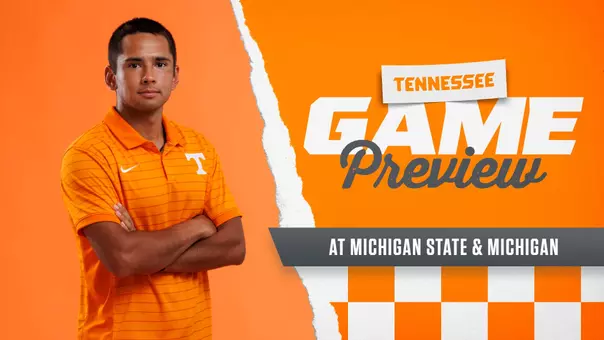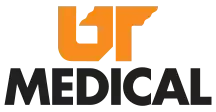University of Tennessee Athletics
Handshake & History
May 18, 2015 | Men's Tennis
By Riley Duncan
UTSports.com
When Mikelis Libietis and Hunter Reese first shook hands in the summer of 2011, there was no way to know how their relationship would unfold. There never is.
Some handshakes amount to nothing more than that, just a random handshake with a random person on a random day. Others turn into deep friendships. Some handshakes start a relationship that ends in pain or agony. Others create something that ends in joy. Looking back, you can connect the dots. Forward? All you can do is guess.
Reese and Libietis were freshman tennis players introducing themselves in Volunteer Hall, the nicest on-campus accommodations that the University of Tennessee has to offer. Hunter Reese had enrolled a semester early, trading in his final spring semester of high school for his first semester of college, making Reese the veteran of the freshman crop. Meanwhile, Libietis, a native of Priekuli, Latvia, was just beginning to settle in to life in the United States.
In fact, the handshake itself was a bit European. It wasn't the traditional American businessman handshake. It wasn't the traditional dap, either. Instead, the two grabbed hands as if they were preparing to partake in an arm-wrestling contest.
Fitting, maybe, because a memorable handshake led to a memorable relationship that would include a four-year reign at the top of the lineup and three national doubles titles.

'THE GREATEST DAY OF OUR LIVES'
Hunter Reese and Mikelis Libietis share the best day of their lives: May 26, 2014.
They ate at Taco Bell. That's not why the day was special, but it was how they celebrated.
"I think I got like six different things," Reese says. "I think I went all out. I got probably a Mexican pizza, I know I got a caramel apple empanada, there's no doubt in my mind. And then, I probably got some sort of box, the $5 box at the time. I went all out, though. I always do. I love Taco Bell."
Mikelis Libietis is not as big of a fan of Taco Bell, so he grabbed a meal elsewhere and brought it in to the Americanized Mexican fast-food chain. Sports Information Director Amanda Pruitt remembers ordering a Mountain Dew Baja Blast.
The real significance of the day occurred hours earlier, when Libietis and Reese took home the 2014 NCAA Doubles Championship in Athens, Ga. It was an incredible match, lasting for more than three hours as the duo took down the fourth-seeded Ohio State team of Peter Kobelt and Kevin Metka in a contest that featured zero breaks of serve and three tiebreakers.
On match point No. 4, the Vols finally had their chance. Metka double faulted deep in the deciding tiebreaker to give the 7-6 lead. Libietis got his second serve in and handled a tough approach shot on a ball that skipped off the top of the net. A split second later, Tennessee held its first doubles title since 1980.
"I actually remember sitting [in Taco Bell] and thinking to myself that these people don't know that Mikelis and I just had the greatest day of our lives," says Reese. "We just won a national championship. I just was thinking, `We did that. We did that.'"
The doubles championship was the sweet reward after countless long hours and years of hard work. On already impressive resumes, it stands out in big, bold, all-caps letters.
"That was by far the best moment I've ever had in my life," says Libietis.
"It's on another level from anything else," says Reese. "Having done it, but also in the fashion we did it, where we kind of rolled through the tournament and got to the final and just played an absolutely epic match with no breaks of serve and three-odd something hours, and the way we were just able to keep up that level of intensity, that level of focus and the way our opponents were able to. And then we got our chance and took it. It's on a pedestal above anything else we've done."

THE ROCK
Hunter Reese takes off his orange Tennessee hat -- marked by a season's worth white sweat stains -- to shake my hand. It's a sunny day in late April, and we're sitting in the bleachers of Barksdale Stadium, where the Vols have just finished up practice on their home court.
Not washing his practice hat is one of Hunter Reese's many superstitions. There's a laundry list of them (pardon the pun). He starts each point with the side of his Wilson frame that says "Blade" facing towards the sky. He avoids stepping on cracks. When he plays a match, he wears a black wristband on his right wrist and a white wristband on his left. He always sits on the outside of the bench, while Mikelis Libietis sits on the inside near the official. During his sophomore season, he would pick out which racket Libietis would use for matches. For some reason, that superstition ended. Maybe because they lost.
Reese grew up in Kennesaw, Ga., a fan of the in-state Bulldogs. His parents played tennis recreationally, and he picked up the sport as a child as well as baseball, soccer, and some basketball. When Reese was eight or nine years old, he narrowed his sports to baseball and tennis. Going in to high school, he cut baseball, leaving tennis as his sport of choice.
A year later, at age 15, Reese told his tennis coach that his dream was to play college tennis in the SEC, for the University of Georgia. His coach laughed. Reese admits that the coach was simply being honest; he wasn't good enough.
His dream could have ended right there, as so many dreams do, with someone telling him no. It's clear to anyone that knows Reese knows that there is no quit in him, though. Coaches and teammates make it clear that he has a rare work ethic and competitive spirit.
For Reese, it's simply about taking things seriously. He wants to be the best he can be at everything he does. Libietis has been impressed with Reese's attitude from the moment they first met.
"He's an unbelievable competitor," says Libietis. "I hadn't seen a competitor like that when I was growing up. He was just fighting for everything, in life. He's taking challenges in school, in tennis, in everything. That was the first thing that stood out to me."
That spirit turned Reese's dream into a reality, where he transformed himself into one of the top junior players in the South and had the opportunity to go to an SEC program of his choice.
In the end, the University of Tennessee won out over Georgia and other big time programs. Reese became the first UT tennis player from the state of Georgia since 1993. After Reese broke his wrist in high school, Tennessee head coach Sam Winterbotham remained on the recruiting trail. Reese says that a big part of his decision was influenced by coaches Winterbotham and Chris Woodruff's messages and weekly phone calls.
"I just felt like they wanted me here, and that was important to me, to feel wanted," says Reese.
Reese enrolled a semester early at UT in the spring of 2011. He redshirted the spring season, and says that semester was invaluable in his transition to college tennis.
It didn't take long for Reese to make an impact on the court for the Vols. He became Tennessee's No. 2 singles player as a redshirt freshman, and his doubles pairing with Libietis quickly became the Vols' top duo. By chance, the two were paired up for the 2011 USTA/ITA Ohio Valley Regional Championships. They won the tournament, and the rest is history.
As a redshirt sophomore and junior, Reese continued to excel, earning First Team All-SEC and ITA All-American honors. The pairing of Reese and Libietis - nicknamed by Woodruff as the "Rock and Hammer" as freshmen -- has remained dominant in doubles.

THE HAMMER
Mikelis Libietis hits the tennis ball hard. Really hard. Similar to a transcendent power hitter in baseball, the ball sounds different when he makes contact.
While Hunter Reese has his superstitions, Libietis has his own quirks. He hates when people toast but don't drink. He insists that his practice partner shake his hand after they finish hitting. He stays up to watch playoff basketball and hockey nearly every night. He really loves Latvia.
Latvia, of course, is where Libietis grew up. There were not a lot of facilities or resources available to aspiring tennis players, but his father started a small tennis community, finding a small group of players that would practice and play every day. Mikelis began playing tennis when he was four years old, often competing against his older brother Matiss.
Matiss was three years older than Mikelis, and a better player until Mikelis reached age 16. This always gave the younger brother a challenge and helped him get experience against better players. Matiss went on to play at Hawaii Pacific University, and Mikelis continued to climb. Mikelis had success playing tournaments around Europe and began to be recruited by some high-profile schools. He knew that tennis was what he wanted to pursue as a career. It was the reason he was going to school in the United States.
"When I was looking at schools, my first thing was tennis ... because I wanted to develop, get better, and hopefully to go pro after that," says Libietis.
Vols' associate head coach Chris Woodruff played a huge part in Libietis' recruitment by name recognition alone. Woodruff was a player both Mikelis and his father recognized, as he had played tennis professionally, reaching the No. 29 ranking in the world during the 1990s and 2000s and pulled off tour victories over such legends as Pete Sampras and Andre Agassi.
Once Libietis arrived on campus, it was the first time that Mikelis had not been coached by his father. Woodruff became Libietis and Reese's primary coach in doubles.
Libietis was very talented coming in to college but was not much of a worker. He'll admit that. Listening to Libietis talk, it's clear that he has matured during his time at Tennessee.
"When I was younger, everyone said I was really talented, but I kind of hated to work hard," Libietis says. "I didn't really know what that means. I didn't know what it means to really practice every day for two hours, then go do lifting, then go do running. I think that's where college helped me. You have a set schedule. You have running in the morning. You have tennis practice, you have individual tennis practice, and then you have lifting."
College tennis gave him structure. It gave him a schedule, a community, and a passion to focus on every day. In all, he lost 25 pounds after coming to college. The adjustment to life in the United States hasn't necessarily been easy for Libietis, though. English is his second language, and studies have at times proved overwhelming. On the tennis court, though, Libietis has excelled.
He has been named to the All-SEC First Team in all four of his seasons at Tennessee and has earned ITA All-American honors in his final three. He was the Vols' top singles player in his freshman and sophomore seasons and earned the No. 1 ranking in the country in both singles and doubles (with Reese) during his sophomore year, as well as SEC Player of the Year. Libietis' junior year brought unexpected challenges. Elbow and back injuries plagued him, and the challenges of being a student-athlete caught up to him.
"Last year was a struggle for me. It wasn't easy," Libietis says. "I really, really struggled with just college, and I kind of wanted to go pro after my second (sophomore) year because I was playing so well, and I just kind of got lost in college. Sometimes, I feel like it's tough for someone like me, coming from Latvia, to come in here for four years and study and do all the tennis. It's pretty exhausting."
Libietis fell from playing as the Vols' top singles player to the number two spot and finished the year with a singles record of 23-15, more than double the losses of his sophomore year. Throughout the injuries, though, Libietis remained a gamer. This was the same year, after all, that Libietis and Reese won their doubles championship.
Before there was injury, there was illness. Both he and Reese fought through on-site illness to win their breakthrough national doubles title at the 2013 ITA All-American Championship.
Libietis has returned to peak form in his senior year. Going into the NCAA Singles Championships, posting a record of 24-3 in singles matches, including a near-flawless 18-1 at the top of the lineup in team play. Though he didn't win SEC Player of the Year, Libietis couldn't be happier with the way he's been playing.
"I've been playing really well. A lot of confidence. I think I'm even playing better than my sophomore year. I think I've grown a lot. I've been practicing really hard."

OUR TEAMMATE, OUR FRIEND
Sean Karl was one of the Vols who travelled to Georgia to watch Libietis and Reese win their doubles title. You can't tell the story of two Vols' tennis players without telling the story of Sean Karl. His impact is tangible. You can feel it just talking to people that knew him.
Karl was a highly ranked in-state recruit for the Vols' 2013 class from Ravenwood High School in Brentwood. In October 2012, a month before signing day, Karl was diagnosed with Ewing's Sarcoma, a rare type of bone and tissue cancer.
He signed with the Vols anyway, and after months of treatment, Karl was cleared to play tennis for the Vols in the 2013-2014 season.
In November of 2013, though, the cancer returned. A year later, he passed away.
Libietis was roommates with Sean. Reese played against him growing up. His death hit everyone hard. Sean Karl serves as an inspiration to so many, and it's no surprise the late Vol will be honored by the Tennessee Sports Hall of Fame with the Courage Award in June. It's clear talking to Reese and Libietis how much he meant to them. In matches inside Goodfriend Tennis Center this season, the two played doubles on the newly renamed Sean Karl Court.
There's a shift in the mood when we talk about Sean.
"It was tough to watch him go through what he went through," Reese says. "Everyone on the team, we all kind of rallied around him. We had meetings with him, and he always talked about us giving him strength and all this, but that just wasn't the case.
"He just, he was such an inspiration to all of us, and the way he carried himself and handled himself throughout the whole process, throughout his whole journey, was just something that when I think about, and when I was going through it, I just don't know how he did it. Because I don't think anyone on this planet is strong enough to do what he did in the manner in which he did it. So, it was just an honor to play with him, an honor to know him, an honor to play against him in the juniors, and an honor to know his family, still."

THE NCAA TOURNEY & BEYOND
Up next for Hunter Reese and Mikelis Libietis is the NCAA individual championships. They enter the doubles championships seeded fourth and Libietis is seeded (9-16) for a second time in singles.
After that, Reese and Libietis plan to start their professional tennis careers. They have tentative plans to tour in Europe this summer, playing together and linking up to play tournaments with former Vol Jarryd Chaplin. Reese and Libietis won the Knoxville Challenger together in November - becoming the first college team to ever do so - so they will begin their tour both ranked around 600 in the ATP world doubles rankings.
Before they do call it quits in college, though, the duo would like to celebrate one last time.
I hear Taco Bell is open til' midnight or later.
















